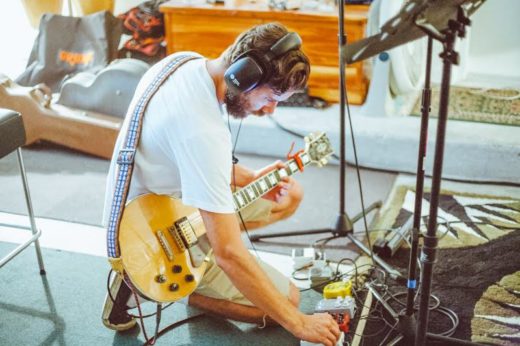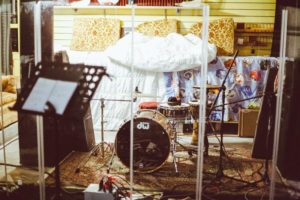Ghost in the Sprawl
Timothy Stanley

All photos courtesy Rodrigo Cayo
We were heading to Miramar, a small suburban city north of Miami, where, despite its name, you cannot see the sea. What you can see are miles of big box stores, tract housing, strip malls and car dealerships. Hidden somewhere in all that sprawl is the home of Goin’ Ghost, a new indie music label created by musicians Jason Mavila, Ian Mercel, and Juan Ledesma, and visual artist Krista Merrell. The label is currently producing Milewski’s forthcoming album, “Quarry,” and Dan was going up to Miramar to lay down some new tracks in their recording studio.

My tossing and turning the night before was the work of a particularly vivid nightmare I’d had. In my dream, professional wrestler John Cena is walking down a flag-lined Main Street in Anytown, USA while lecturing me on the beauty of ethnic and gender diversity in this country. “To love America,” Cena reminds me, “is to love all Americans.” The shame of being scolded for intolerance by a member of the WWE is nothing compared to the shame of deserving it so thoroughly, and Cena’s “slamsplaining” jolted me awake. As we drove east across the city, my tired eyes glazing over the freeway noise barriers etched with decorative bas-reliefs of soaring birds of prey, I reminded myself that it was all just a bad dream.
When we finally pulled into the sunny, suburban driveway, the Ghosts were waiting for us. I was kindly offered a beer and sank into a couch in the studio to listen to them play. A couple minutes into the first take of “All My People” and my nerves began to settle. Milewski’s brand of spacious, balladic country is comforting, and more than happy to simply transmit a familiar feeling rather than reinvent any wheels. Part Polish, part French-Canadian from a suburb of working-class Worcester, Massachusetts, Milewski sings with that Northeastern, Springsteen gravel, which, when paired with his southern-style guitar, unites north and south in a kind of idealized American sound. “As if you took the Grand Canyon and put it in a cathedral,” was how he explained it to me. “As though the sound was excavated.”

Milewski sang and played his ’76 Les Paul Custom. Ledesma followed along on bass. Mavila ran back and forth from the drum set to the mixing room. Ian Mercel, the team’s master technician, wasn’t there that day, so Mavila had to do double duty as a session musician and engineer—not that he seemed to be having any less fun.
The name Goin’ Ghost is an affectionate nod to the two years Mavila fell off the grid and out of communication. Though “ghosting,” he was not idle, and spent the time transforming the garage of his parent’s Miramar home into a fully functioning recording studio. From his years working in live music, he inherited an impressive cache of instruments and high-end recording equipment, and without his father’s pale yellow workbench or the overhead door tracks bolted to the stucco ceiling, you’d never know you were in a garage.

For lunch we drove to a nearby Chick-Fil-A. Walking in, I tried to remember whether this was the American fast food chain that hated black people, hated gay people, snuck Bible verses onto burger wrappers, or regularly served its customers horsemeat. It felt like a good time to talk expectations.
As we ate, I asked the guys about their hopes for Goin’ Ghost. Each of them mentioned the pleasure of creating something that belonged to them, that gave them “a feeling of productivity,” as Mavila put it, and served as a relief from the frustrations of their respective day jobs. Mavila and Mercel are both professional sound engineers who work for commercial labels and venues. Merrell does graphic design for a jewelry company. Ledesma is an art handler working for museums and galleries around the city. And apart from being the father of two young boys, Milewski is a visual artist for whom music has been, to this point, a secondary focus. The “brass ring” for all of them seems to be no shinier than the opportunity to make music, their music, full-time.

But the nostalgic, DIY vibe of Goin’ Ghost isn’t entirely a romantic, for-love-of-the-game decision. It’s also a punkish break for the industry’s back door, and an appeal to America’s sole soft spot: an underdog story. Despite their youthful ambition, the Ghosts seem committed to keeping the project small, and to agreeing unanimously on the music they record and the ways in which they release it. If it works, it will be because they’re talented and because their enthusiasm for music, not just the playing but also the recording of it, is contagious. If it doesn’t, well, it doesn’t really matter. Goin’ Ghost, however humble of one, is a check in America’s “plus” column, and these days, I’ll take all of those I can get.
Back in the studio, everyone gathered around the command center as Mavila played back the day’s recordings. Ledesma lay on the ground and stared up at the ceiling, trying to pick out the differences in his bass lines from take to take. Milewski gave notes, and both Mavila and Ledesma acquiesced to their artist with the graceful patience of industry vets. I was in the throes of a gauzy, pink-and-sea-foam-green daydream brought on by the beers, the heat, and the music.

On the wall by the door, mounted above a pair of conga drums, is a poster of John Lennon holding up a peace sign while standing in front of the Statue of Liberty. I’ll admit, watching the Peruvian Ledesma, and Mavila, the son of Peruvian and Cuban immigrants, keeping time to the Polish-American Milewski’s country folk in a garage in suburban Florida, it’s tempting to believe in John Cena’s vision of America. What began as an omen conjured by my subconscious to fill me with a murky dread had transformed into a hopeful reminder: you may not be able to see the ocean from Miramar, but you can see a bit of the country.
Once home, I played some of Milewski’s songs as I jotted down notes about my day. At that moment, the music felt to me like the perfect soundtrack for the last scene of the series finale of America. As the credits rolled, and the sun set on the West, I finally fell asleep.
Timothy Stanley is an artist and writer from NYC.










